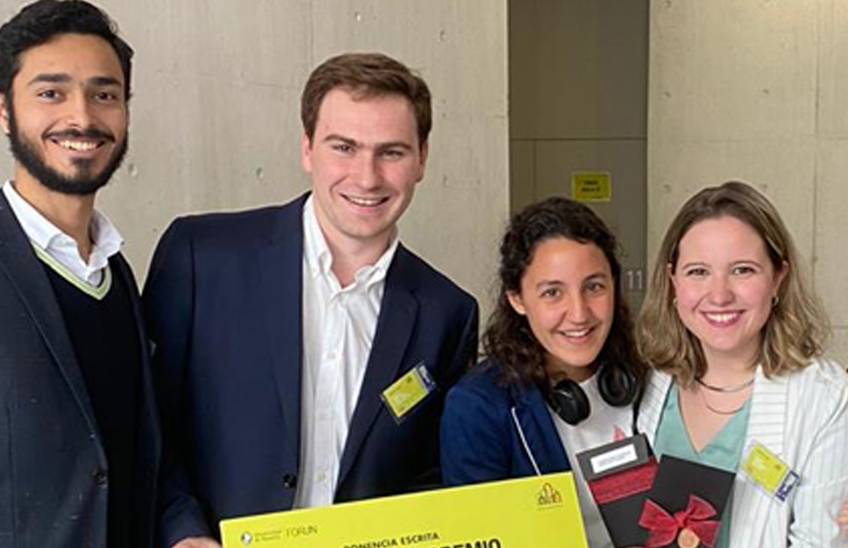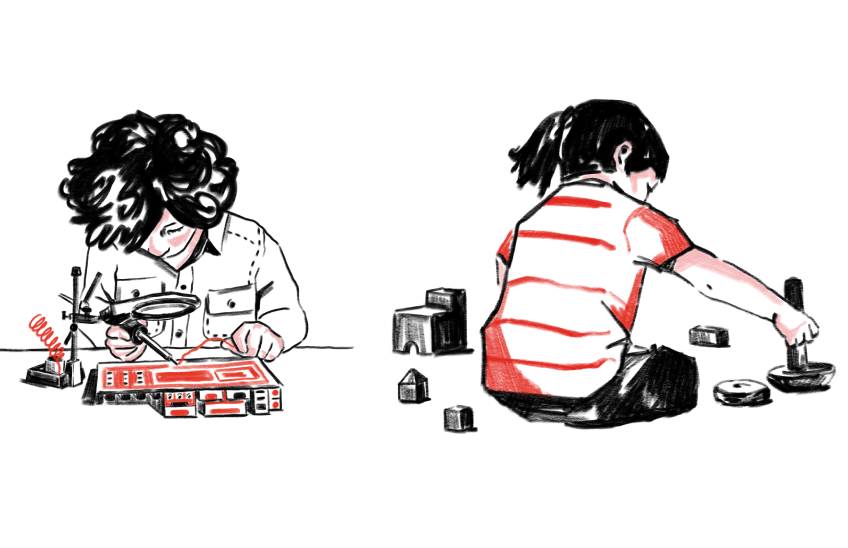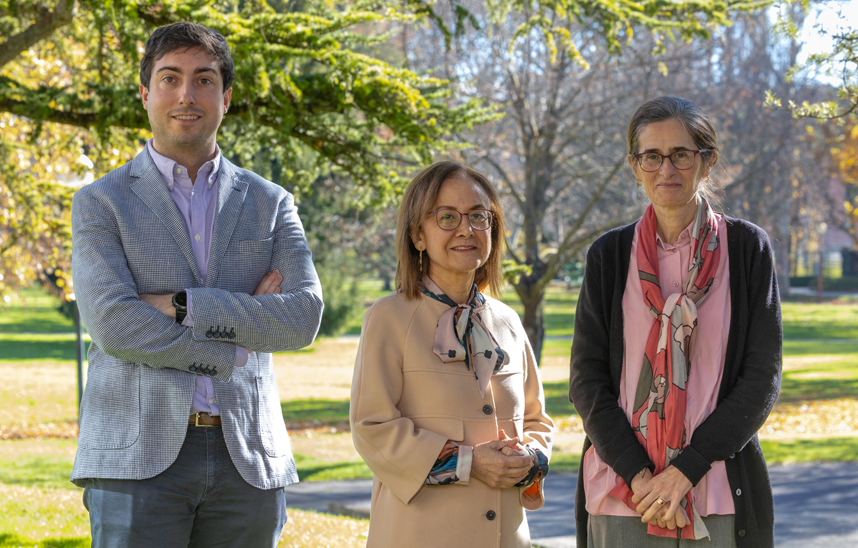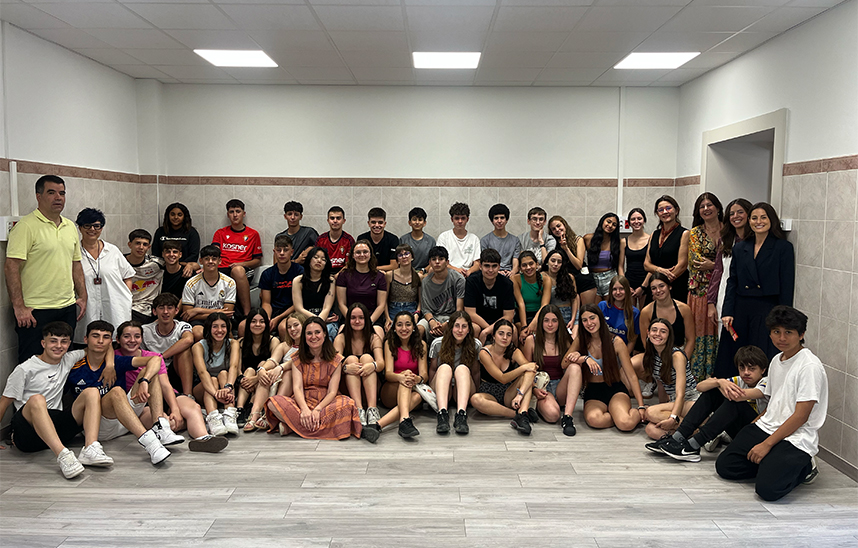Five students from School of Education and Psychology, winners of Forun 2020
The students belong to different courses of Degree and Master's Degree

FotoCedida/Fromleft to right: Alejandro Rosas, Carlos Jaurrieta, Patricia Rus and Carmen Bueno. Missing from the photo is student Akemi Watanabe.
27 | 02 | 2020
Five students from the School from Education and Psychology won last Saturday, the discussion paper written congress Forun 2020, organized by the University of Navarra.
They are Carlos Jaurrieta, student of the Master's Degree in facultyspecialization program Orientation), Akemi Watanabe, third year of the Double Degree in Primary Education and Pedagogy; Carmen Bueno and Patricia Rus, third year of the Degree in Psychology; and their first year classmate, Alejandro Rosas.
In this interview, the students explain the process that led them to elaborate their work: "Application of transformational leadership in student representation at the University of Navarra". This research has been directed by the professor of the School of Education and Psychology, Begoña Urien.
Why did you decide to participate in Forun?
Carmen Bueno (CB): The idea was brought to us by Loreto Pérez-Santana, coordinator of programs of study at School. Although in previous years students from Education or Psychology had participated in senior high school or interdisciplinary groups, to date no School team had been formed as such.
Carlos Jaurrieta (CJ): Loreto told me that he had made this proposal and, as I found the initiative attractive, I went to a Forun session that the delegates of our School had, I loved the idea and I got involved without thinking twice.
Akemi Watanabe (AW) area : This year's topic "Next generation leaders" seemed to us not only extremely interesting for any student, but also relevant to our daily work. Definitely, the opportunity to do research and contribute to our university community was a motivating factor for our participation.
What is the goal of your work and why did you feel it was important to to address this topic?
AW: Our main goal has always been to find some way to explain and respond to the environment we perceive in our School, from the point of view of peer leadership. We believe that it is of utmost importance to promote leadership among all students, who, because of their programs of study, go into areas closely related to leadership, but often do not feel sufficiently prepared to put it into action.
Patricia Rus (PR): For many of us it is the first time that we are part of the student representation. Sometimes we feel a little helpless because we are 'walking in the dark'. For us, it is essential that someone with 'experience' helps us on a day-to-day basis. For this reason, having the right tools beforehand would be very beneficial.
You are all course delegates or sub-delegates. What have you learned that you can apply in your day-to-day work as course representatives?
CJ: Well, the truth is that due to the way we have approached the work the learning has been very different. We have not gone deeper into the characteristics of leadership, but we have seen the importance of leadership among peers. The questions we have asked our peers have given us a lot of light and we have realized the great work ahead of us.
AW: Actually the whole work was about finding leadership for our colleagues, so in writing it we had to reflect on our own internship. After working on these ideas, we could only be consistent with our actions as delegates.
CB: I think the best thing to do is to try to motivate student body to lead from the beginning. We have to be aware that what we study will lead us to a future in which there is no room for 'not knowing or not wanting to lead'.
PR: And to begin with, we would like to promote an active attitude, both on and off the classroom , with which all students can get to know, learn and, as a consequence, increase their motivation to get involved in leadership.
Alejandro Rosas (AR): I have learned different ways to represent and motivate class to take the initiative in those aspects they want to change. Being able to work with upperclassmen has allowed me to contrast perspectives on the delegate, identify problems and learn from them for the future.
Some of you are studying Education, others Psychology. How can you apply what you have learned to your field of study, for now and for the future?
CB: In my role as a teacher and educator, I am concerned about the lack of leadership among students at Education. They need to be made aware that, in the future, they will have to lead a certain group of people; and they need to be given the tools and the training so that they can do it in the best possible way. On the other hand, this work has given me the opportunity to look for a solution to a problem and to try to solve it. Something that I will have to do very often if I want to be a good professor or delegate.
AW: Now we want to reflect more than ever our intention to drive the development of all our colleagues and to cultivate together the characteristics of transformational leadership, which we arrived at on our research. As we look to the future, this will be a continuous learning process that will allow us, in any field, to be professionals and people more committed to the progress of each of the people around us.
AR: It doesn't matter if we are in the field of psychology or Education, we will be constantly contact with people and knowing how to handle group situations will be very useful.



